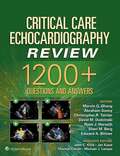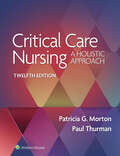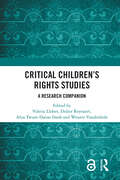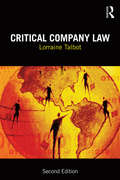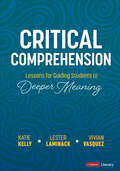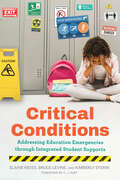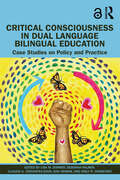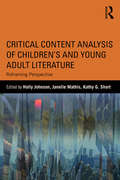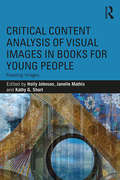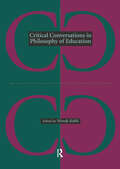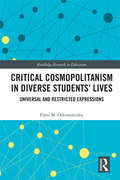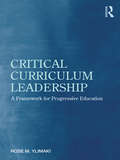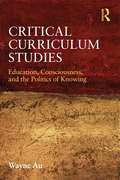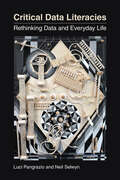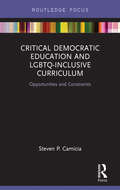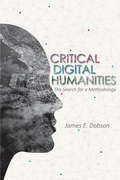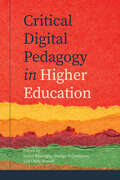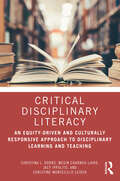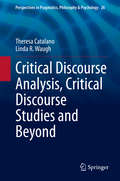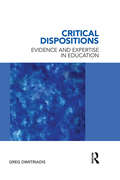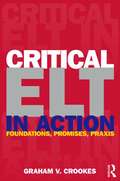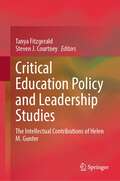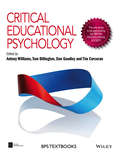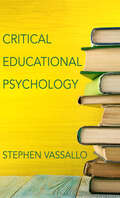- Table View
- List View
Critical Care Echocardiography Review: 1200+ Questions and Answers
by Sheri Berg Abraham Sonny Marvin G Chang David Dudzinski Christopher R Tainter Ryan J Horvath Edward BittnerPrepare for success on the Examination of Special Competence in Critical Care Echocardiography (CCEeXAM)! Critical Care Echocardiography Review is a first-of-its-kind, review textbook containing over 1,200 questions and answers. Helmed by Drs. Marvin G. Chang, Abraham Sonny, David Dudzinski, Christopher R. Tainter, Ryan J. Horvath, Sheri M. Berg, Edward A. Bittner as well as a team of associated editors and authors from institutions across the nation , this highly visual resource covers every aspect of the use of ultrasound for clinical diagnosis and management in the critical care setting, providing a thorough, effective review and helping you identify areas of mastery and those needing further study.
Critical Care Nursing: A Holistic Approach
by Paul Thurman Patricia Gonce MortonComprehensive, evidence-based, and expertly written, Critical Care Nursing: A Holistic Approach, 12th Edition, helps you confidently prepare today’s students for the highly specialized and complex challenges of critical care nursing practice. This trusted, must-have text integrates clear, concise writing, engaging resources, and a proven holistic approach to instill the clinical competence students need to care for patients who are critically ill and their families. More efficiently organized and easier to use than ever, the 12th Edition presents theory and principles within the context of practical application to streamline students’ transition to successful critical care practice.
Critical Children’s Rights Studies: A Research Companion
by Wouter Vandenhole Afua Twum-Danso Imoh Didier Reynaert Valeria LlobetThe field of children’s rights studies is well established and largely dominated by a top-down approach that considers these rights as objective standards requiring implementation in practice or policy. This book argues for a critical perspective which views the area as contested terrain with conflicting normative foundations and traditions. The collection brings together established and rising scholars whose work has been central to not only challenging mainstream children’s rights discourses but also provides alternative pathways to conceptualizing children’s rights. It moves beyond critiques of these dominant discourses and sets out the emerging paradigm of Critical Children’s Rights Studies drawing on contexts in both the Global North and Global South. It proposes new pathways and subjects these to scrutiny, illuminating the importance of contextual situatedness and acknowledging the need to consider researchers’ own positionality when outlining their stance on children’s rights.Containing both empirical and theoretical scholarship, the book will be an essential resource for students, academics, researchers and policy-makers working in the multidisciplinary areas of childhood studies, children’s rights studies and international human rights.
Critical Company Law
by Lorraine TalbotThe second edition of Critical Company Law provides a framework in which to understand how the company functions in society and a thorough grounding in modern legal doctrine. It shows how modern company law is shaped by a multi-layered history of politics, ideology, economics and power. Through the lens of political economic theory the book shows how the company becomes the mechanism through which the state makes political choices about distributing societies’ wealth and through which it responds to economic crises. The current law reflects an economy marked by a disjuncture between the low profits of the productive economy and the high profits of the finance economy. Critical Company Law examines areas of company law to show how they reflect a fragile economy inexorably drawn to social and economic inequality and short-termism. These include: • The Doctrine of Separate Corporate Personality • Groups of Companies and Tort Liabilities • Company Formation and the Constitution • Directors’ Duties and Authority • Corporate Capacity • Shares and Shareholders • Raising and Maintaining Capital • Minority Protection In this uniquely hybrid book the legal topics are treated with detail and clarity, providing an engaging introduction to the key topics required for a student of company law.
Critical Comprehension [Grades K-6]: Lessons for Guiding Students to Deeper Meaning (Corwin Literacy)
by Lester Laminack Vivian Maria Vasquez Katie KellyBecause high-level comprehension cannot be divorced from wide-ranging texts To be literate is to think through multiple perspectives, exploring diverse texts, and using the power of story to give students the life skills to discuss just about anything with critical curiosity. Critical Comprehension transforms this vital work into an accessible, three-step lesson process. Using picture books, multimodal texts, and thoughtfully framed questions, each differentiated lesson expands students’ understanding of a text through: First read: the "movie read", during which the text is read without interruption Second read: The teacher poses questions that probe deeper meanings through interaction with the text to summarize, name and highlight issues, analyze and infer, to make more informed decisions about what to believe and what to question. Third read: Harnessing students’ curiosities, the class revisits the text to talk back to theme, symbols, central idea, or social, cultural, historical influences at work on author and audience Popular media, classic novels, breaking news — the world’s content is ready for students to absorb. But are we ready to help them read it well? Equipped with this resource, the answer is, Yes, we are.
Critical Comprehension [Grades K-6]: Lessons for Guiding Students to Deeper Meaning (Corwin Literacy)
by Lester Laminack Vivian Maria Vasquez Katie KellyBecause high-level comprehension cannot be divorced from wide-ranging texts To be literate is to think through multiple perspectives, exploring diverse texts, and using the power of story to give students the life skills to discuss just about anything with critical curiosity. Critical Comprehension transforms this vital work into an accessible, three-step lesson process. Using picture books, multimodal texts, and thoughtfully framed questions, each differentiated lesson expands students’ understanding of a text through: First read: the "movie read", during which the text is read without interruption Second read: The teacher poses questions that probe deeper meanings through interaction with the text to summarize, name and highlight issues, analyze and infer, to make more informed decisions about what to believe and what to question. Third read: Harnessing students’ curiosities, the class revisits the text to talk back to theme, symbols, central idea, or social, cultural, historical influences at work on author and audience Popular media, classic novels, breaking news — the world’s content is ready for students to absorb. But are we ready to help them read it well? Equipped with this resource, the answer is, Yes, we are.
Critical Conditions: Addressing Education Emergencies Through Integrated Student Supports
by Elaine Weiss Bruce Levine Kimberly SterinA proactive, ground-level approach to student support that helps ameliorate the effects of socioeconomic challenges and improves outcomes for students, families, and communities
Critical Consciousness in Dual Language Bilingual Education: Case Studies on Policy and Practice
by Claudia G. Cervantes-Soon Deborah Palmer Emily R. Crawford Lisa M. Dorner Dan HeimanThis book features case studies that address dual language bilingual education (DLBE) programs, which offer content instruction in two languages to help youth develop fluent bilingualism/biliteracy, high academic achievement, and sociocultural competence. While increasingly popular, the DLBE model is a framework that comes with unique hurdles and challenges. Applying a pioneering critical consciousness approach, the volume provides readers with narratives, awareness, and tools to support culturally and linguistically diverse students and their families. Organized around four major areas—policy, leadership, family and community engagement, teaching and teacher learning—the volume’s case studies bring together stories from policymakers, educational leaders, family and community members, and teachers. The case studies spotlight examples in which power imbalances have been identified and shifted through critically conscious actions and offer insight into how to ensure all DLBE programs are nurturing, empowering, multilingual environments for all students, particularly racialized, immigrant, and transnational students. Accessible and varied, the case studies address important topics such as anti-Black racism, digital access, disability, school-district relations, working with undocumented families, and more. Each chapter includes a case narrative, teaching notes, discussion questions, and/or teaching activities to support stakeholders who wish to develop and enact equity in their DLBE policies, classrooms, and professional development. A key resource for supporting student needs and transformative inquiry in the classroom, this book is ideal for graduate students, professors, leaders, educators, and other stakeholders in bilingual education and language education.
Critical Content Analysis of Children’s and Young Adult Literature: Reframing Perspective
by Holly Johnson Kathy G. Short Janelle MathisIn this book the authors describe their strategies for critically reading global and multicultural literature and the range of procedures they use for critical analyses. They also reflect on how these research strategies can inform classrooms and children as readers. Critical content analysis offers researchers a methodology for examining representations of power and position in global and multicultural children’s and adolescent literature. This methodology highlights the critical as locating power in social practices by understanding, uncovering, and transforming conditions of inequity. Importantly, it also provides insights into specific global and multicultural books significant within classrooms as well as strategies that teachers can use to engage students in critical literacy.
Critical Content Analysis of Visual Images in Books for Young People: Reading Images
by Holly Johnson Kathy G. Short Janelle MathisExtending the discussion of critical content analysis to the visual realm of picturebooks and graphic novels, this book provides a clear research methodology for understanding and analyzing visual imagery. Offering strategies for "reading" illustrations in global and multicultural literature, chapter authors explore and bring together critical theory and social semiotics while demonstrating how visual analysis can be used to uncover and analyze power, ideologies, inequity, and resistance in picturebooks and graphic novels. This volume covers a diverse range of texts and types of books and offers tools and procedures for interpreting visual images to enhance the understandings of researchers, teachers, and students as they engage with the visual culture that fills our world. These methods are significant not only to becoming a critical reader of literature but to also becoming a critical reader of visual images in everyday life.
Critical Conversations in Philosophy of Education
by Wendy KohliCritical Conversations in Philosophy of Education presents a series of conversations expressing many of the multiple voices that currently constitute the field of philosophy of education. Philosophy of education as a discipline has undergone several turns--the once marginal perspectives of the various feminisms, critical Marxism, and poststructuralist, postmodernist and cultural theory have gained ground alongside those of Anglo-analytic and pragmatic thought. Just as Western philosophers in general are coming to terms with the "end of philosophy" pronouncement implicit in postmodernism, so too are philosophers of education faced with similar challenges--challenges to long-held moral, political, aesthetic and epistemological commitments. The contributors take up these challenges through a dialogical structure, expressing differing positions without engaging in destructive critique.
Critical Cosmopolitanism in Diverse Students’ Lives: Universal and Restricted Expressions (Routledge Research in Education #32)
by Eleni M. OikonomidoyBased on a qualitative meta-analysis of data from five studies conducted with secondary and college students, this book explores the multiple ways in which sources of cosmopolitan agency exist in their lives. Grounded in a framework of critical cosmopolitanism, this book examines how students’ identities develop in new contexts and how their perceptions of themselves change. With a focus on native-born, international, immigrant, and refugee students, Oikonomidoy discusses the ways in which students express their cosmopolitan orientations and interact in cross-cultural settings, and offers insights for scholars and teacher educators.
Critical Curriculum Leadership: A Framework for Progressive Education
by Rose M. YlimakiAlthough traditional curriculum and instructional leadership frameworks have dominated educational administration training for almost thirty years, it has become increasingly clear that even the most recent frameworks have failed today’s leaders who struggle with the politics of curriculum decisions on a daily basis. Critical Curriculum Leadership is an examination of curriculum leadership in the wake of U.S. testing mandates and school reforms, all of which seem to support a particular set of conservative ideologies. Drawing from her own longitudinal ethnographic study and from existing literature and research in the field, Ylimaki explores the formation of curriculum leadership in relation to broader cultural and political shifts. She shows how traditional leadership frameworks have come up short, and makes the case for an alternative leadership theory at the intersection of educational leadership and curriculum studies. She provides analytical tools that inspire progressive education and offers critical theories, strategies, research examples, problem-posing cases, and research ideas essential for curriculum leadership in the present conservative era. Critical Curriculum Leadership will appeal to the many educational leadership scholars and practitioners who are interested in developing effective and socially just curricula in their schools and districts as well as curriculum scholars who are interested in leadership issues.
Critical Curriculum Studies: Education, Consciousness, and the Politics of Knowing (Critical Social Thought)
by Wayne AuA CHOICE Outstanding Academic Title 2012! Critical Curriculum Studies offers a novel framework for thinking about how curriculum relates to students’ understanding of the world around them. Wayne Au brings together curriculum theory, critical educational studies, and feminist standpoint theory with practical examples of teaching for social justice to argue for a transformative curriculum that challenges existing inequity in social, educational, and economic relations. Making use of the work of important scholars such as Freire, Vygotsky, Hartsock, Harding, and others, Critical Curriculum Studies, argues that we must understand the relationship between the curriculum and the types of consciousness we carry out into the world.
Critical Data Literacies: Rethinking Data and Everyday Life
by Neil Selwyn Luci PangrazioA guide to everything you need to understand to navigate a world increasingly governed by data.Data has become a defining issue of current times. Our everyday lives are shaped by the data that is produced about us (and by us) through digital technologies. In this book, Critical Data Literacies, Luci Pangrazio and Neil Selwyn introduce readers to the central concepts, ideas, and arguments required to make sense of life in the data age. The authors challenge the idea that datafication is an inevitable and inescapable condition. Drawing on emerging areas of scholarship such as data justice, data feminism, and other critical data studies approaches, they explore how individuals and communities can empower themselves to engage with data critically and creatively.Over the course of eight wide-ranging chapters, the book introduces readers to the main components of critical data literacies—from the fundamentals of identifying and understanding data to the complexities of engaging with more combative data tactics. Critical Data Literacies explores how the tradition of critical literacies can offer a powerful foundation to address the big concerns of the data age, such as issues of data justice and privacy, algorithmic bias, dataveillance, and disinformation. Bringing together cutting-edge thinking and discussion from across education, sociology, psychology, and media and communication studies, Critical Data Literacies develops a powerful argument for collectively rethinking the role that data plays in our everyday lives and re-establishing agency, free will, and the democratic public sphere.
Critical Democratic Education and LGBTQ-Inclusive Curriculum: Opportunities and Constraints (Routledge Research in Teacher Education)
by Steven P. CamiciaThis book illustrates the relationship between politics and the ways in which lesbian, gay, bisexual, transgender, and queer (LGBTQ) issues are taught in schools. This book examines relationships between society, schools, and LGBTQ inclusion in order to understand perennial issues related to critical democratic education, and how schools are responding to generational shifts in ideology. By conducting a case study comparison of California and Utah, Camicia provides an in-depth view of the politically and culturally different landscapes that shape LGBTQ curriculum in schools. This book will synthesize and extend theoretical frameworks to describe, analyze, and interpret the shifting landscapes in public education as they relate to LGBTQ issues in schools. Through queer theory and democratic education theory, Camicia offers recommendations to public schools and teacher educators about socially just ways to create inclusive LGBTQ curriculum.
Critical Digital Humanities: The Search for a Methodology (Topics in the Digital Humanities)
by James E DobsonCan established humanities methods coexist with computational thinking? It is one of the major questions in humanities research today, as scholars increasingly adopt sophisticated data science for their work. <P><P>James E. Dobson explores the opportunities and complications faced by humanists in this new era. Though the study and interpretation of texts alongside sophisticated computational tools can serve scholarship, these methods cannot replace existing frameworks. <P><P>As Dobson shows, ideas of scientific validity cannot easily nor should be adapted for humanities research because digital humanities, unlike science, lack a leading-edge horizon charting the frontiers of inquiry. <P><P>Instead, the methods of digital humanities require a constant rereading. At the same time, suspicious and critical readings of digital methodologies make it unwise for scholars to defer to computational methods. <P><P>Humanists must examine the tools--including the assumptions that went into the codes and algorithms--and questions surrounding their own use of digital technology in research. <P><P>Insightful and forward thinking, Critical Digital Humanities lays out a new path of humanistic inquiry that merges critical theory and computational science.
Critical Digital Pedagogy in Higher Education (Issues in Distance Education)
by George Veletsianos Chris Rowell Suzan KöseoğluRecent efforts to solve the problems of education—created by neoliberalism in and out of higher education—have centred on the use of technology that promises efficiency, progress tracking, and automation. The editors of this volume argue that using technology in this way reduces learning to a transaction. They ask administrators, instructors, and learning designers to reflect on our relationship with these tools and explore how to cultivate a pedagogy of care in an online environment. With an eye towards identifying different and better possibilities, this collection investigates previously under-examined concepts in the field of digital pedagogy such as shared learning and trust, critical consciousness, change, and hope.
Critical Disciplinary Literacy: An Equity-Driven and Culturally Responsive Approach to Disciplinary Learning and Teaching
by Jacy Ippolito Christina L. Dobbs Megin Charner-Laird Christine Montecillo LeiderThis accessible book introduces a new theory of critical disciplinary literacy (CDL) that merges criticality and disciplinary literacy approaches in a cohesive and inclusive framework. There are unique hurdles in integrating critical and culturally sustaining approaches to literacy into specialized content area classrooms, but this book provides clear, research-grounded strategies and methods that will appeal to teachers and help them foster equitable literacy learning opportunities for all students. Using a critical lens, chapters deconstruct and reconstruct pathways for new practices that push back on familiar, normative literacy approaches in the disciplines. Authors provide a framework for designing new approaches to disciplinary literacy both for and with students, and they present innovative and practical strategies for implementation. With real-world examples from the field, this book will be essential reading for preservice teachers and in courses on literacy and disciplinary instruction.With vignettes and classroom examples from educators who have been enacting elements of CDL practices for years, this book will be essential reading for preservice educators in courses on both literacy and content instruction. Furthermore, current and seasoned educators and educational leaders will find this book to be an invaluable resource as they wrestle with how to teach disciplinary literacy in ways that move away from approaches that have historically marginalized many voices to approaches that include and center students’ languages, histories, and cultures.
Critical Discourse Analysis, Critical Discourse Studies and Beyond (Perspectives in Pragmatics, Philosophy & Psychology #26)
by Linda R. Waugh Theresa CatalanoThis book explores the problem-oriented interdisciplinary research movement comprised of Critical Discourse Analysis (CDA) and Critical Discourse Studies (CDS) for scholars, teachers, and students from many backgrounds. Beginning with a Preface by renowned CDA/CDS scholar Ruth Wodak, it introduces CDA/CDS through examples of what its research looks like, delineates various precursors to CDA/CDS and important foundational concepts and theories, and traces its development from its early years until it became established. After the relationship between CDA and CDS is discussed, seven commonly cited approaches to CDA/CDS are outlined, including their connections and differences, their origins and development, major and associated scholars, research focus(es), and central concepts and distinguishing features. After a summary of critiques of CDA/CDS and responses by CDA/CDS scholars, the book provides an overview of its salient connections to other interdisciplinary areas of scholarship such as critical applied linguistics, education, anthropology/ ethnography, sociolinguistics, gender studies, queer linguistics, pragmatics and ecolinguistics. The final chapter describes how scholars use their knowledge of CDA/CDS to make a difference in the world.
Critical Dispositions: Evidence and Expertise in Education
by Greg DimitriadisSet against the current proliferation of global "difference" and economic realignment, Critical Dispositions explores the notions of "evidence" and "expertise" in times of material scarcity. Both have come to the forefront of national and international debate in education as "evidence" and "evidence-based" research and pedagogical practices continue as major trends in educational policy. Author Greg Dimitriadis maintains this debate is best understood as part of a broader rise in professional and managerial discourses in various aspects of educational research and practice. Each aims to control and contain some aspect of research and practice in ways that are increasingly specific and targeted. As demonstrated through examples from critical intellectuals and artists outside the field of education, this current proliferation of specific, autonomous fields of inquiry and practice marks a much deeper ambivalence about our contemporary moment and how we understand it. Following Bourdieu and other theorists, Dimitriadis argues that educational researchers and practitioners today must be increasingly self-reflexive about the positions they take up in various fields of inquiry, what they allow us to see and to understand, what they blind us to. This kind of self-reflexivity, however, is becoming increasingly difficult today as material demands and dislocations are forcing educators to occupy particular fields in more specific ways. Unpacking this tension and offering alternative "thinking tools" is at the core of this volume.
Critical ELT in Action: Foundations, Promises, Praxis
by Graham V. CrookesUniquely bridging theory and practice, this text introduces and overviews the various domains associated with the term critical pedagogy in the field of TESOL/ELT. Critical pedagogy addresses concepts, values, curriculum, instructional and associated practices involved in language teaching for social justice. Bringing critical pedagogy to classroom practitioners in a practical and comprehensible way, the text is designed to help teachers get started on critically grounded work in their own teaching. Features• Textbook extracts offer direct and quick illustration of what this perspective might look like in practice• Coverage of feminist and anti-racist pedagogies; sexual identity, oppression and pedagogy; peace and environmental education; and critical English as a foreign language—and their implications for second-language teaching • Historical background• Theoretical background on language and learning• Consideration of applicability of critical/radical educational concepts and traditions to non-Western cultural contexts • A focus on issues of compromise and resistance This original, timely, and informative text is ideal for any course on methods and approaches in TESOL.
Critical Education Policy and Leadership Studies: The Intellectual Contributions of Helen M. Gunter
by Tanya Fitzgerald Steven J. CourtneyThis edited collection is a Festschrift to Helen M. Gunter, a leading scholar in the field of education policy and leadership. We draw on the concept of the Festschrift as a collection of papers, or chapters, that recognise, honour, and celebrate the work and contributions of an esteemed academic. Gunter’s work has opened up the field of critical education policy and leadership studies and provoked, if not revitalised, scholarly thinking about the origins, structures, patterns and impact of the field. Gunter’s personal commitment to intellectual leadership of the field and public education resonates across all her scholarly works. The core intention of this unique collection is to recognise Gunter’s scholarly contributions as an academic, practitioner and public intellectual. Invited authors have been asked to reflect critically on ways in which Gunter’s work and intellectual support have influenced their own research, teaching and academic engagement. In their reflections, contributors not only speak to the intellectual work of Gunter but suggest how they have taken this work forward and how this has advanced the field of education as well as the production of knowledge.
Critical Educational Psychology
by Dan Goodley Antony J. Williams Tom Billington Tim CorcoranThe first textbook of its kind, Critical Educational Psychology is a forward-thinking approach to educational psychology that uses critical perspectives to challenge current ways of thinking and improve practice.
Critical Educational Psychology: An Application Of Critical Educational Psychology (Educational Psychology Ser. #15)
by Stephen VassalloIntroducing students and scholars to the emerging field of critical educational psychology.The field of critical studies recognizes that all knowledge is deeply embedded in ideological, cultural, political, and historical contexts. Although this approach is commonly applied in other subfields of psychology, educational psychology—which is the study of human learning, thinking, and behavior in formal and informal educational contexts—has resisted a comprehensive critical appraisal. In Critical Educational Psychology, Stephen Vassallo seeks to correct this deficit by demonstrating how the psychology of learning is neither neutral nor value-free but rather bound by a host of contextual issues and assumptions. Vassallo invites teachers and teacher educators, educational researchers, and educational psychologists to think broadly about the implications that their use of psychology has on the teaching and learning process. He applies a wide variety of interdisciplinary approaches to examine the psychology of learning, cognitive development, motivation, creativity, discipline, and attention. Drawing on multiple perspectives within psychology and critical theory, he reveals that contemporary educational psychology is entangled in and underpinned by specific political, ideological, historical, and cultural contexts.A valuable resource for anyone who relies on psychology to interact with, assess, and deliberate over others, especially school-aged children, Critical Educational Psychology resists neatly packaged theories, models, and perspectives that are intended to bring some basis and certainty to pedagogical decision-making. This book will enhance teachers’ ethical decision-making and start important new conversations about power and opportunity.
